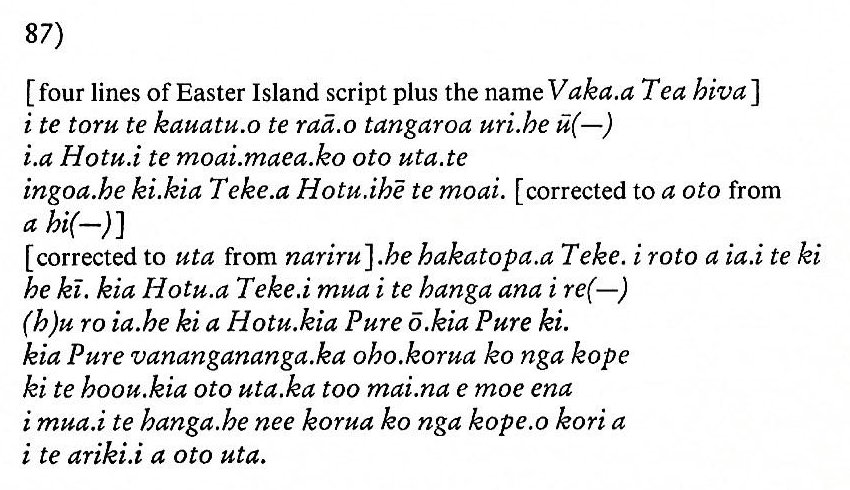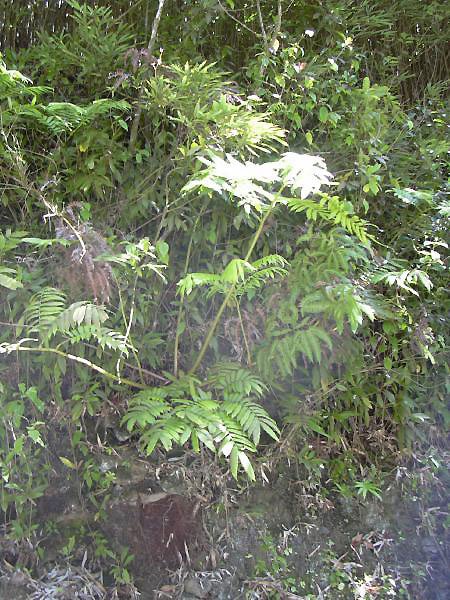
|
E:87 → 3 * 29 |
|
Four lines of
Easter Island script plus the name Vaka.a Tea
hiva:
= segments
from Br5, Br6, Br7, and Br8 (The Eighth Land,
p. 290.)
[cfr E:83] |
|
i te toru te
kauatu.o te raā.o tangaroa uri.he ū(-) |
On the thirtieth
day of the month of October ('Tangaroa Uri'),
Hotu asked about the stone figure (moai maea)
named Oto Uta [te
moai.maea.ko oto uta.te ingoa]. |
|
i.a Hotu.i te
moai.maea.ko oto uta.te |
|
ingoa.he ki.kia
Teke.a Hotu.ihē te moai. (corrected to a
oto from a hi(-)
corrected to uta
from nariru).he
hakatopa.a Teke. i roto a ia.i te ki |
Hotu said to Teke [he
ki.kia Teke.a Hotu], 'Where is the
figure Oto Uta (corrected in the manuscript for
Hina Riru)?' |
|
Topa. 1.
To bend down, to drop to the ground; to fall on
a certain date. 2. To stop doing something, to
drop; ina ekó topa taau aga, do not stop,
keep doing your work. 3. To remain, to be left
over, to be unfinished; he topa te kai,
the food is not finished, there is some left. 4.
To come to one's memory; i te aamu he topa te
vânaga tûai, in the legends old words come
to memory. 5. To remember, to reflect (with
mana'u as subject); e-topa rivariva
tokorua mana'u ki te me'e nei, let the two
of you think carefully about this thing. Vanaga.
1. Wine; topa tahaga, id. 2. To fall in
drops, to descend, to go down, to abdicate;
topa iho, to fall; hakatopa, to knock
down, to cause to fall; hakatopa ki raro,
to knock down, to subjugate. 3. Childbirth,
abortion; topa te poki, to lie in. 4. A
feast, to feast. 5. To arrive, to result;
topa rae, newcome; topa iho, to come
unexpectedly; topa ke, to deviate;
topa no mai, topa hakanaa, topa
tahaga, mau topa pu, unexpected;
topa okotahi, solitary; hakatotopa,
to excite, to foment. 6. Bad, low, cheap,
failure; igoa topa, nickname; ariga
topa, sinister, sly, ill-tempered, to hang
the head; hakatopa, to disparage;
hakatotopa, irresolute. 7. (Of upward
movement) topa ki raro, to scale, to
surpass; hakatopa ki te ao, to confer a
dignity; hakatopa ki te kahu, to spread a
sail; hakatotopa, to make a genealogy.
Churchill.
Topatagi. To remember with sorrow, to
miss, to pine for (mo); ananake te raá
he topatagi te ûka riva ko Uho mo toona ga
matu'a, Ko Uho the good girl missed her
parents every day. Vanaga. Grief. Churchill. |
|
he kī. kia
Hotu.a Teke.i mua i te hanga ana i re(-) |
Teke thought about
the question [he
hakatopa.a Teke. i roto a ia.i te ki]
and then said to Hotu [he
kī. kia Hotu.a Teke], 'It was left
out in the bay.' [i
mua i te hanga ana i re(h)u
ro ia.] |
|
(h)u ro ia.he ki a
Hotu.kia Pure ō.kia Pure ki. |
Hotu
said [he ki a
Hotu] to Pure O [Ō],
to Pure Ki, and to Pure Vanangananga: 'You
fellows (kope),
sail [ko
oho.korua ko nga kope] to the friend
(hoou),
to Oto Uta. Bring him here [ka
too mai], he who is resting out there
in the bay [i
mua.i te hanga].
Move him carefully (?
nee),
you fellows, so that the king, that Oto Uta is
not damaged!' [o
kori a i te ariki.i a oto uta.] |
|
kia Pure
vananganaga.ko oho.korua ko nga kope |
|
ki te hoou.kia oto
uta.ka too mai.ma e moe ena |
|
i mua.i te hanga.he
nee korua ko nga
kope.o kori a |
|
i te ariki.i a oto
uta. |
|
Gete.
M.: Whakangete, to
urge on a horse. Ngetengete, to make a
clicking sound with the tongue. to click with
the tongue, as to a horse; to chirrup. To
express surprise or sorrow. Cf. ketekete,
to express surprise or regret. H.: neke,
an indistinct sound, as scratching on a rough
board; to make the noise of scratching; to
scratch. Cf. ekeeke, to be in pain;
displeasure, arising from an offence; the
feeling which one has when that which he prizes
is spoken against or injured. T.: ete, to
flinch; eteete, to be shocked disgusted,
or ashamed. Cf. paete, to be made angry.
To.: cf. ketekete, to chirrup; kekete,
to chirp; to chatter. Text Centre.
... I remember from somewhere in Heyerdahl's
books that he considered it significant that
neke-neke was a special word in the
vocabulary of Easter Island, it meant 'walking
without legs, walking by moving the weight this
side and that slowly advancing forward'. He had
discovered the word when he asked how the
statues had been moved - they walked (neke-neke)
was the answer ...
Nahe.
Ta.: Angiopteris erecta [maybe
evecta?: 'Mule's-foot Fern']. Sa.: nase,
the giant fern. Churchill. Bishop Jaussen:
crustacé. Barthel. In Jamaica the species
Angiopteris evecta ['Mule's-foot
Fern'] is widely naturalized and is registered
as an invasive species. The plant was introduced
by Captain Bligh from Tahiti as a staple food
for slaves and cultivated in the Castleton
Gardens in 1860. From there it was able to
distribute itself throughout the eastern half of
the island. Wikipedia.
E:68a - 69a:
|
1 |
he |
ngaatu |
a Oti. |
|
1 |
tavari |
|
1 |
riku |
|
1 |
ngaoho |
|
1 |
naunau. |
|
1 |
uku koko |
|
1 |
nehenehe |
|
1 |
poporo. |
|
1 |
kavakava atua |
|
1 |
kohe. |
|
1 |
nehenehe [sic!] |
|
1 |
pua |
|
1 |
harahara |
|
1 |
hua taru. |
|
1 |
makere |
|
1 |
hata. |
|
1 |
tuere heu. |
|
1 |
tureme |
|
1 |
matie. |
|
1 |
pua nakonako. |
|
1 |
ipu ngutu |

|
|